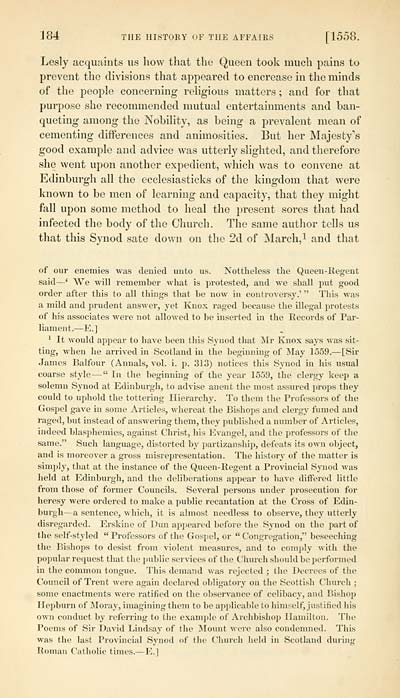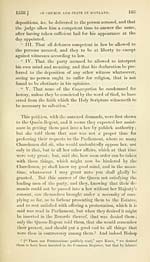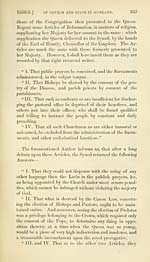Spottiswoode Society > History of the affairs of the Church and State of Scotland from the beginning of the reformation to the year 1568 > Volume 1
(320) Page 184
Download files
Complete book:
Individual page:
Thumbnail gallery: Grid view | List view

J 84 THE HISTORY OF THE AFFAIRS [1558.
Lesly acquaints us how that the Queen took much pains to
prevent the divisions that appeared to encrease in the minds
of the people concerning religious matters ; and for that
purpose she recommended mutual entertainments and ban-
queting among the Nobility, as being a prevalent mean of
cementing differences and animosities. But her Majesty's
good example and advice was utterly slighted, and therefore
she went upon another expedient, which was to convene at
Edinburgh all the ecclesiasticks of the kingdom that were
known to be men of learning and capacity, that they might
fall upon some method to heal the present sores that had
infected the body of the Church. The same author tells us
that this Synod sate down on the 2d of March, 1 and that
of our enemies was denied unto us. Nottheless the Queen-Regent
said — ' We will remember what is protested, and we shall put good
order after this to all things that be now in controversy.' " This was
a mild and prudent answer, yet Knox raged because the illegal protests
of his associates were not allowed to be inserted in the Records of Par-
liament. — E.]
1 It would appear to have been this Synod that Mr Knox says was sit-
ting, when he arrived in Scotland in the beginning of May 1559. — [Sir
James Balfour (Annals, vol. i. p. 313) notices this Synod in his usual
coarse style — " In the beginning of the year 1559, the clergy keep a
solemn Synod at Edinburgh, to advise anent the most assured props they
could to uphold the tottering Hierarchy. To them the Professors of the
Gospel gave in some Articles, whereat the Bishops and clergy fumed and
raged, but instead of answering them, they published a number of Articles,
indeed blasphemies, against Christ, his Evangel, and the professors of the
same." Such language, distorted by 2>artizanship, defeats its own object,
and is moreover a gross misrepresentation. The history of the matter is
simply, that at the instance of the Queen-Regent a Provincial Synod was
held at Edinburgh, and the deliberations appear to have differed little
from those of former Councils. Several persons under prosecution for
heresy were ordered to make a public recantation at the Cross of Edin-
burgh — a sentence, which, it is almost needless to observe, they utterly
disregarded. Erskine of Dun appeared before the Synod on the part of
the self-styled " Professors of the Gospel, or " Congregation," beseeching
the Bishops to desist from violent measures, and to comply with the
popular request that the public services of the Church should be performed
in the common tongue. This demand was rejected ; the Decrees of the
Council of Trent were again declared obligatory on the Scottish Church ;
some enactments were ratified on the observance of celibacy, and Bishop
Hepburn of Moray, imagining them to be applicable to himself, justified his
own conduct by referring to the example of Archbishop Hamilton. The
Poems of Sir David Lindsay of the Mount were also condemned. This
was the last Provincial Synod of the Chinch held in Scotland during
Roman Catholic times. — E.l
Lesly acquaints us how that the Queen took much pains to
prevent the divisions that appeared to encrease in the minds
of the people concerning religious matters ; and for that
purpose she recommended mutual entertainments and ban-
queting among the Nobility, as being a prevalent mean of
cementing differences and animosities. But her Majesty's
good example and advice was utterly slighted, and therefore
she went upon another expedient, which was to convene at
Edinburgh all the ecclesiasticks of the kingdom that were
known to be men of learning and capacity, that they might
fall upon some method to heal the present sores that had
infected the body of the Church. The same author tells us
that this Synod sate down on the 2d of March, 1 and that
of our enemies was denied unto us. Nottheless the Queen-Regent
said — ' We will remember what is protested, and we shall put good
order after this to all things that be now in controversy.' " This was
a mild and prudent answer, yet Knox raged because the illegal protests
of his associates were not allowed to be inserted in the Records of Par-
liament. — E.]
1 It would appear to have been this Synod that Mr Knox says was sit-
ting, when he arrived in Scotland in the beginning of May 1559. — [Sir
James Balfour (Annals, vol. i. p. 313) notices this Synod in his usual
coarse style — " In the beginning of the year 1559, the clergy keep a
solemn Synod at Edinburgh, to advise anent the most assured props they
could to uphold the tottering Hierarchy. To them the Professors of the
Gospel gave in some Articles, whereat the Bishops and clergy fumed and
raged, but instead of answering them, they published a number of Articles,
indeed blasphemies, against Christ, his Evangel, and the professors of the
same." Such language, distorted by 2>artizanship, defeats its own object,
and is moreover a gross misrepresentation. The history of the matter is
simply, that at the instance of the Queen-Regent a Provincial Synod was
held at Edinburgh, and the deliberations appear to have differed little
from those of former Councils. Several persons under prosecution for
heresy were ordered to make a public recantation at the Cross of Edin-
burgh — a sentence, which, it is almost needless to observe, they utterly
disregarded. Erskine of Dun appeared before the Synod on the part of
the self-styled " Professors of the Gospel, or " Congregation," beseeching
the Bishops to desist from violent measures, and to comply with the
popular request that the public services of the Church should be performed
in the common tongue. This demand was rejected ; the Decrees of the
Council of Trent were again declared obligatory on the Scottish Church ;
some enactments were ratified on the observance of celibacy, and Bishop
Hepburn of Moray, imagining them to be applicable to himself, justified his
own conduct by referring to the example of Archbishop Hamilton. The
Poems of Sir David Lindsay of the Mount were also condemned. This
was the last Provincial Synod of the Chinch held in Scotland during
Roman Catholic times. — E.l
Set display mode to: Large image | Transcription
Images and transcriptions on this page, including medium image downloads, may be used under the Creative Commons Attribution 4.0 International Licence unless otherwise stated. ![]()
| Permanent URL | https://digital.nls.uk/79600628 |
|---|
| Description | Volume I. |
|---|---|
| Attribution and copyright: |
|

